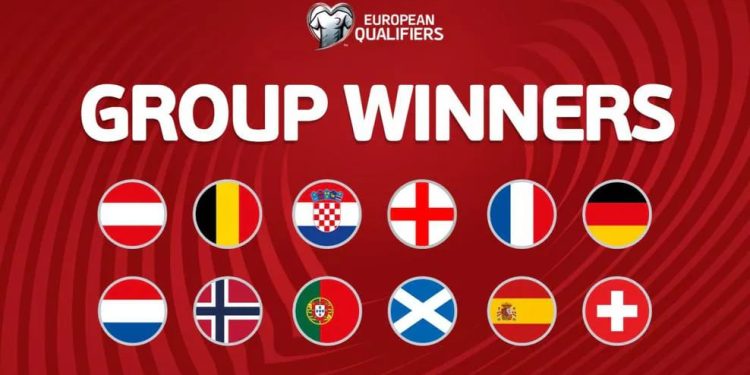World Cup 2026: Which European teams have qualified?
There are a total of 16 UEFA berths available at the 48-team 2026 FIFA World Cup, with the 12 qualifying group winners assured of a final tournament place along with the four eventual play-off winners.
Austria, Belgium, Croatia, England, France, Germany, Netherlands, Norway, Portugal, Scotland, Spain and Switzerland have confirmed their places at the finals, which run from 11 June to 19 July 2026 across Canada, Mexico and the United States.
UEFA.com keeps track of the qualifiers as they are confirmed and runs the rule over the European contenders.
How does qualification work?
In total, 16 UEFA nations will qualify for the 2026 World Cup. The 12 group winners qualify directly for the World Cup; the four remaining berths are determined by play-offs involving the 12 group runners-up along with the four best-ranked group winners of the 2024/25 UEFA Nations League that did not finish their European Qualifiers group stage in first or second place.
AUSTRIA
How they qualified: Group H winners
Best World Cup performance: Third place (1954)
Most recent appearance: 1998 (group stage)
Austria will be playing at their eighth World Cup finals and making an appearance for the first time since 1998 after edging past Bosnia and Herzegovina and Romania to claim top spot in Group H. Veteran forward Marko Arnautović has led by example with eight goals in qualifying, while Ralf Rangnick’s side also have experience in abundance from the likes of captain and centre-back David Alaba, midfielder Marcel Sabitzer and ever-dangerous midfielder Michael Gregoritsch.
BELGIUM
How they qualified: Group J winners
Best World Cup performance: Third place (2018)
Most recent appearance: 2022 (group stage)
The Red Devils confirmed their place at a fourth consecutive World Cup finals in emphatic style, dispatching Liechtenstein 7-0. Bronze medallists in 2018, Belgium disappointingly exited at the group stage four years ago in Qatar, but will be hopeful that the likes of the evergreen Kevin De Bruyne along with raw young talent such as Jeremy Doku and Charles De Ketelaere can pave the way for a more successful campaign this time around.
CROATIA
How they qualified: Group L winners
Best World Cup performance: Runners-up (2018)
Most recent appearance: 2022 (third place)
A nation that continues to punch above its weight, 2018 runners-up Croatia again qualified relatively comfortably after taking six wins and one draw from their first seven games. Midfield maestro Luka Modrić continues to pull the strings at 40 years old, while coach Zlatko Dalić has already guided his country to a World Cup final and semi-final along with a UEFA Nations League showpiece, and will be hungry for another deep run in the tournament.
ENGLAND
How they qualified: Group K winners
Best World Cup performance: Winners (1966)
Most recent appearance: 2022 (quarter-finals)
The UEFA EURO 2024 runners-up began a new era when Thomas Tuchel replaced Gareth Southgate after that showpiece defeat by Spain in Berlin and the German coach has certainly made his mark. England secured qualification after just six games and finished with a 100% record in Group K, scoring 22 goals while conceding none. The talismanic Harry Kane continues to lead the line, but the supporting cast has grown ever deeper, with the likes of Anthony Gordon and Elliot Anderson particularly impressive.
FRANCE
How they qualified: Group D winners
Best World Cup performance: Winners (1998, 2018)
Most recent appearance: 2022 (runners-up)
Les Bleus will be aiming to reach a third World Cup final in a row after topping Group D to secure an eighth consecutive qualification. With an outrageously talented squad led by star striker Kylian Mbappé, Didier Deschamps’ side will no doubt be considered one of the favourites to go all the way again in North America.
GERMANY
How they qualified: Group A winners
Best World Cup performance: Winners (1954, 1974, 1990, 2014)
Most recent appearance: 2022 (group stage)
Julian Nagelsmann’s side stumbled out of the blocks with a 2-0 loss to Slovakia, but a 6-0 victory in the reverse fixture in their final qualifier sent Germany to the finals with a spring in their step. The class of 2014 have now retired from the international stage, but a new generation including Florian Wirtz and target man Nick Woltemade will lead the charge for a fifth global title.
NETHERLANDS
How they qualified: Group G winners
Best World Cup performance: Runners-up (1974, 1978, 2010)
Most recent appearance: 2022 (quarter-finals)
After an intense battle for first spot with Poland, Netherlands eventually came out on top with victory over Lithuania on the final day. Aided by Memphis Depay’s eight goals, and led by the inspirational Virgil van Dijk at centre-back, Oranje have high hopes they can put the disappointment of three previous final defeats behind them and finally win the World Cup for the first time.
NORWAY
How they qualified: Group I winners
Best World Cup performance: Round of 16 (1938, 1998)
Most recent appearance: 1998 (round of 16)
Norway will be appearing at a World Cup finals for the first time in 28 years after impressively beating Italy to secure top spot in Group I. The relentless Erling Haaland scored an extraordinary 16 goals, while fellow Premier League star Martin Ødegaard tallied seven assists. If both players are on song in North America, Norway could well spring a surprise or two.
PORTUGAL
How they qualified: Group F winners
Best World Cup performance: Third place (1966)
Most recent appearance: 2022 (quarter-finals)
Through to their seventh edition in a row, Portugal sealed their place after breezing past Armenia on Matchday 10. Vitinha, João Neves and Bruno Fernandes make things tick in midfield, while Cristiano Ronaldo is still pouring in the goals up front. Yet to reach a final in eight attempts, the Seleção look well equipped to go the distance this time in what could be 40-year-old Ronaldo’s swansong on the international stage.
SCOTLAND
How they qualified: Group C winners
Best World Cup performance: Group stage (1954, 1958, 1974, 1978, 1982, 1986, 1990, 1998)
Most recent appearance: 1998 (group stage)
A sensational final-day win against Denmark in front of a packed Hampden Park took Scotland to their first World Cup since 1998, with manager Steve Clarke having also spearheaded his side’s progress to the finals of EURO 2020 and 2024. Captain Andy Robertson and John McGinn, Scott McTominay and Billy Gilmour all bring Champions League experience to a side who ally defensive resilience with attacking efficiency.
SPAIN
How they qualified: Group E winners
Best World Cup performance: Winners (2010)
Most recent appearance: 2022 (round of 16)
UEFA EURO 2024 winners Spain eased to qualification, a final-day draw with Türki̇ye the only blot on an otherwise perfect record in Group E. The likes of midfielder-cum-striker Mikel Merino and Real Sociedad’s Mikel Oyarzabal particularly impressed in big victories over Türkiye and Bulgaria. Following World Cup round of 16 exits in 2022 and 2018, La Roja will be out to prove a point as they look to follow up on their EURO success in Germany.
SWITZERLAND
How they qualified: Group B winners
Best World Cup performance: Quarter-finals (1934, 1938, 1954)
Most recent appearance: 2022 (round of 16)
Switzerland comfortably navigated a tricky-looking Group B to qualify for a sixth successive World Cup. Although they are no longer able to call on the services of Xherdan Shaqiri, who retired from international football after EURO 2024, in the likes of Manuel Akanji, Granit Xhaka, Dan Ndoye and Breel Embolo, the Swiss still have enough quality to trouble any opponent on their day.
Play-offs
The 12 group runners-up will participate in the play-offs, along with the four best-ranked group winners of the 2024/25 UEFA Nations League that did not finish their European Qualifiers group stage in first or second place. The play-off draw on Thursday 20 November will set the four paths.
Confirmed in play-offs as group runners-up
Albania, Bosnia and Herzegovina, Czechia, Denmark, Italy, Kosovo, Poland, Republic of Ireland, Slovakia, Türkiye, Ukraine, Wales
Confirmed in play-offs via Nations League route
Romania, Sweden, Northern Ireland, North Macedonia









